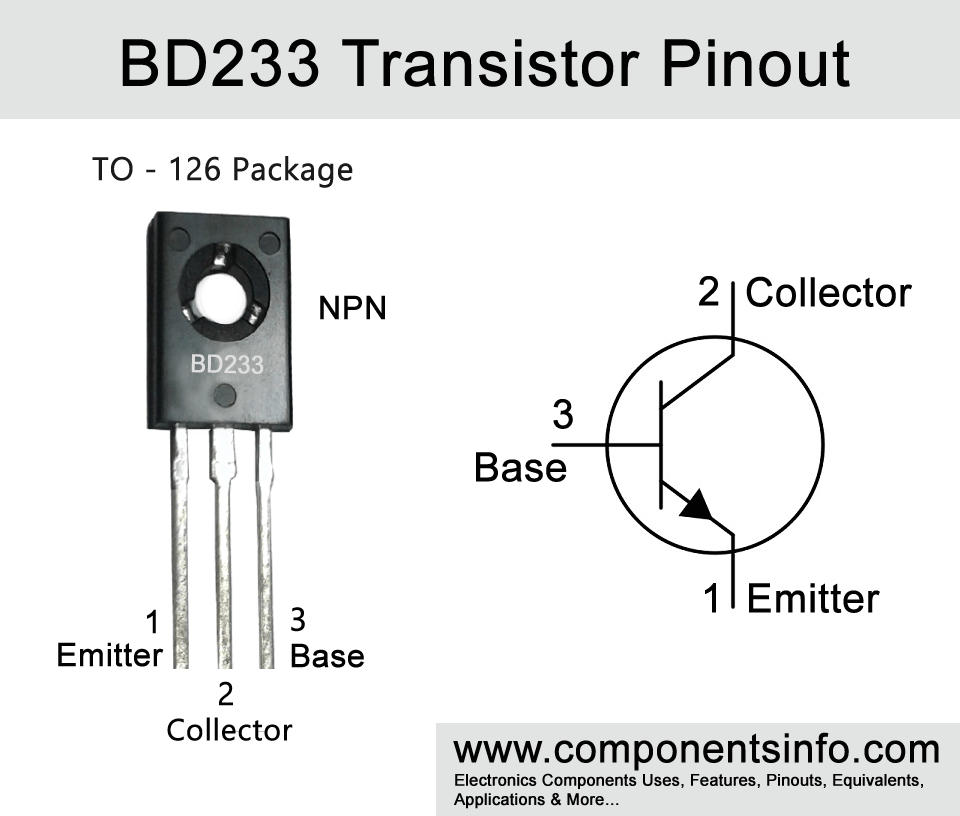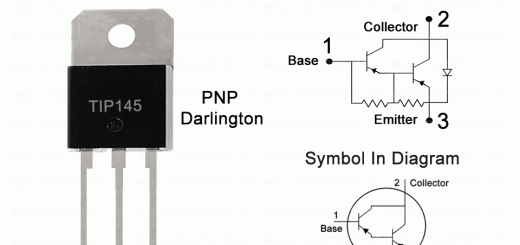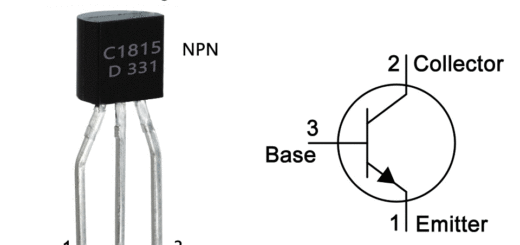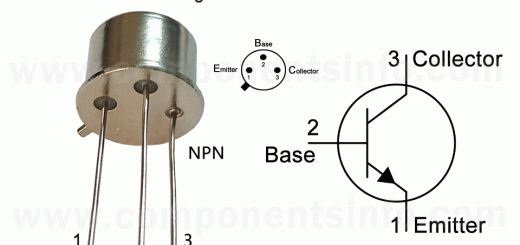BD233 Transistor Pinout, Applications, Equivalents, Features and Other Useful Info
BD233 is an NPN transistor available in TO-125 package. In this post we are exploring the BD233 transistor pinout, applications, equivalents, features and other useful info about this device.
Absolute Maximum Ratings:
- Package Type: TO-126
- Transistor Type: NPN
- Max Collector Current(IC): 2A
- Max Collector-Emitter Voltage (VCEO): 45V
- Max Collector-Base Voltage (VCBO): 45V
- Max Emitter-Base Voltage (VEBO): 5V
- Max Collector Power Dissipation (PC): 25W
- Max Transition Frequency (fT): 3 MHz
- Minimum & Maximum DC Current Gain (hFE): 40
- Max Storage & Operating temperature Should Be: -65 to +150 Centigrade
NPN Complementary:
The NPN complimentary of BD233 is BD234
Replacement and Equivalent:
BD226, BD175, BD165, BDX37, BDX35, BDX787, BD799, BD777, BD679, BD677, BD675, BD189, BD179, BD175, BD177, 2SD974, 2SD1723, 2SD1683, MJE803, MJE802, MJE801, MJE800, MJE240, MJE223, MJE182, MJE181, NTE2345, BD725, BD721, BD683, BD437, BD337, BD333.
BD233 Transistor Explained / Description:
BD233 is another transistor from the BD23X series of NPN medium power transistors available in TO-126 package. Understanding the pin layout of the transistor when looking from the front (part number side) the first pin is Emitter, second is Collector and the third is Base.
The absolute maximum ratings of the transistor are its collector-emitter voltage is 45V, collector current is 2A, collector-base voltage is also 45V, emitter-base voltage is 5V, collector dissipation is 25 Watts, junction temperature is 150 °C and storage temperature is -65 °C to 150 °C.
Now looking at the electrical characteristics the transition frequency of the transistor is 3MHz which makes the transistor good choice to use as audio amplifier. The minimum DC current gain of the transistor is 40 and the collector-emitter saturation voltage is 0.6V.
The transistor is designed to use for switching and amplification applications but can also be used in other applications. The details list of its applications is mentioned below.
Where We Can Use it & How to Use:
As mentioned above the two main applications for which this transistor is designed are amplification and switching, but can also be used in other applications such as controllers and drivers, converters, inverters, etc. Using procedure of the transistor is the same as we use any other BJT transistor.
Applications:
Battery charger circuits
Battery discharging circuits
Power converter circuits
Dimmers
Temperature Control Circuits
Switching Circuits
LED Drivers
Audio Amplifiers
Solar Circuits
Motor Drivers
PWM controllers
DC to AC Converters
Inverter Circuits
Relay drivers circuits
Variety of General Purpose Applications
Safe Operating Guidelines:
Here are some guidelines to use the transistor wisely.
- First of all, it is important to not use the transistor to its absolute maximum ratings and always stay atleast 20% below from its absolute maximum ratings.
- So to follow the above rule the maximum collector to emitter voltage is 45V therefore do not drive load of more than 36V.
- The max collector current is 2A, therefore do not drive load of more than 1.6A.
- Also make sure that the storage or operating temperature of the transistor should be between -55°C to 150°C.
Datasheet:
To download the datasheet just copy and paste the below link in your browser.
https://datasheetspdf.com/pdf-down/B/D/2/BD237_FairchildSemiconductor.pdf



